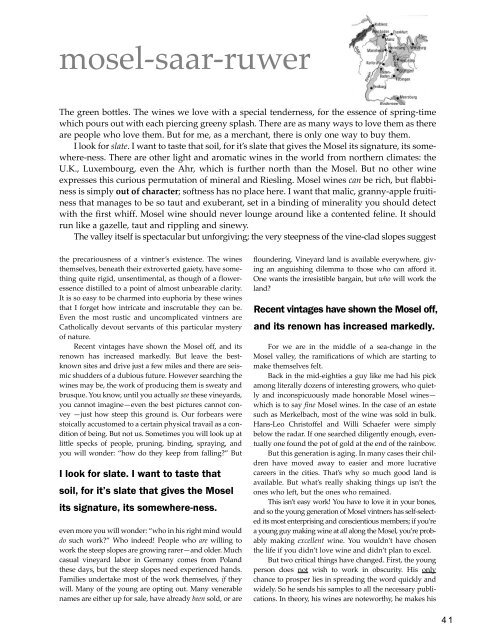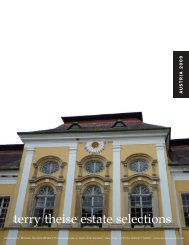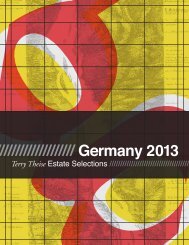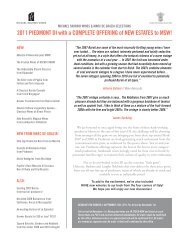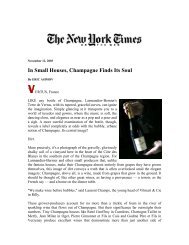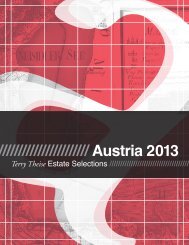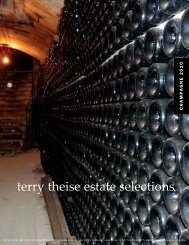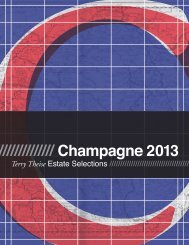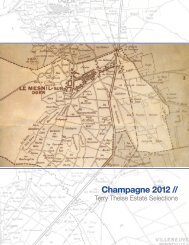German Catalog 2006 USE THIS ONE.qxp - Michael Skurnik Wines
German Catalog 2006 USE THIS ONE.qxp - Michael Skurnik Wines
German Catalog 2006 USE THIS ONE.qxp - Michael Skurnik Wines
You also want an ePaper? Increase the reach of your titles
YUMPU automatically turns print PDFs into web optimized ePapers that Google loves.
mosel-saar-ruwer<br />
The green bottles. The wines we love with a special tenderness, for the essence of spring-time<br />
which pours out with each piercing greeny splash. There are as many ways to love them as there<br />
are people who love them. But for me, as a merchant, there is only one way to buy them.<br />
I look for slate. I want to taste that soil, for it’s slate that gives the Mosel its signature, its somewhere-ness.<br />
There are other light and aromatic wines in the world from northern climates: the<br />
U.K., Luxembourg, even the Ahr, which is further north than the Mosel. But no other wine<br />
expresses this curious permutation of mineral and Riesling. Mosel wines can be rich, but flabbiness<br />
is simply out of character; softness has no place here. I want that malic, granny-apple fruitiness<br />
that manages to be so taut and exuberant, set in a binding of minerality you should detect<br />
with the first whiff. Mosel wine should never lounge around like a contented feline. It should<br />
run like a gazelle, taut and rippling and sinewy.<br />
The valley itself is spectacular but unforgiving; the very steepness of the vine-clad slopes suggest<br />
the precariousness of a vintner’s existence. The wines<br />
themselves, beneath their extroverted gaiety, have something<br />
quite rigid, unsentimental, as though of a floweressence<br />
distilled to a point of almost unbearable clarity.<br />
It is so easy to be charmed into euphoria by these wines<br />
that I forget how intricate and inscrutable they can be.<br />
Even the most rustic and uncomplicated vintners are<br />
Catholically devout servants of this particular mystery<br />
of nature.<br />
Recent vintages have shown the Mosel off, and its<br />
renown has increased markedly. But leave the bestknown<br />
sites and drive just a few miles and there are seismic<br />
shudders of a dubious future. However searching the<br />
wines may be, the work of producing them is sweaty and<br />
brusque. You know, until you actually see these vineyards,<br />
you cannot imagine—even the best pictures cannot convey<br />
—just how steep this ground is. Our forbears were<br />
stoically accustomed to a certain physical travail as a condition<br />
of being. But not us. Sometimes you will look up at<br />
little specks of people, pruning, binding, spraying, and<br />
you will wonder: “how do they keep from falling?” But<br />
I look for slate. I want to taste that<br />
soil, for it’s slate that gives the Mosel<br />
its signature, its somewhere-ness.<br />
even more you will wonder: “who in his right mind would<br />
do such work?” Who indeed! People who are willing to<br />
work the steep slopes are growing rarer—and older. Much<br />
casual vineyard labor in <strong>German</strong>y comes from Poland<br />
these days, but the steep slopes need experienced hands.<br />
Families undertake most of the work themselves, if they<br />
will. Many of the young are opting out. Many venerable<br />
names are either up for sale, have already been sold, or are<br />
floundering. Vineyard land is available everywhere, giving<br />
an anguishing dilemma to those who can afford it.<br />
One wants the irresistible bargain, but who will work the<br />
land?<br />
Recent vintages have shown the Mosel off,<br />
and its renown has increased markedly.<br />
For we are in the middle of a sea-change in the<br />
Mosel valley, the ramifications of which are starting to<br />
make themselves felt.<br />
Back in the mid-eighties a guy like me had his pick<br />
among literally dozens of interesting growers, who quietly<br />
and inconspicuously made honorable Mosel wines—<br />
which is to say fine Mosel wines. In the case of an estate<br />
such as Merkelbach, most of the wine was sold in bulk.<br />
Hans-Leo Christoffel and Willi Schaefer were simply<br />
below the radar. If one searched diligently enough, eventually<br />
one found the pot of gold at the end of the rainbow.<br />
But this generation is aging. In many cases their children<br />
have moved away to easier and more lucrative<br />
careers in the cities. That’s why so much good land is<br />
available. But what’s really shaking things up isn’t the<br />
ones who left, but the ones who remained.<br />
This isn’t easy work! You have to love it in your bones,<br />
and so the young generation of Mosel vintners has self-selected<br />
its most enterprising and conscientious members; if you’re<br />
a young guy making wine at all along the Mosel, you’re probably<br />
making excellent wine. You wouldn’t have chosen<br />
the life if you didn’t love wine and didn’t plan to excel.<br />
But two critical things have changed. First, the young<br />
person does not wish to work in obscurity. His only<br />
chance to prosper lies in spreading the word quickly and<br />
widely. So he sends his samples to all the necessary publications.<br />
In theory, his wines are noteworthy, he makes his<br />
41


